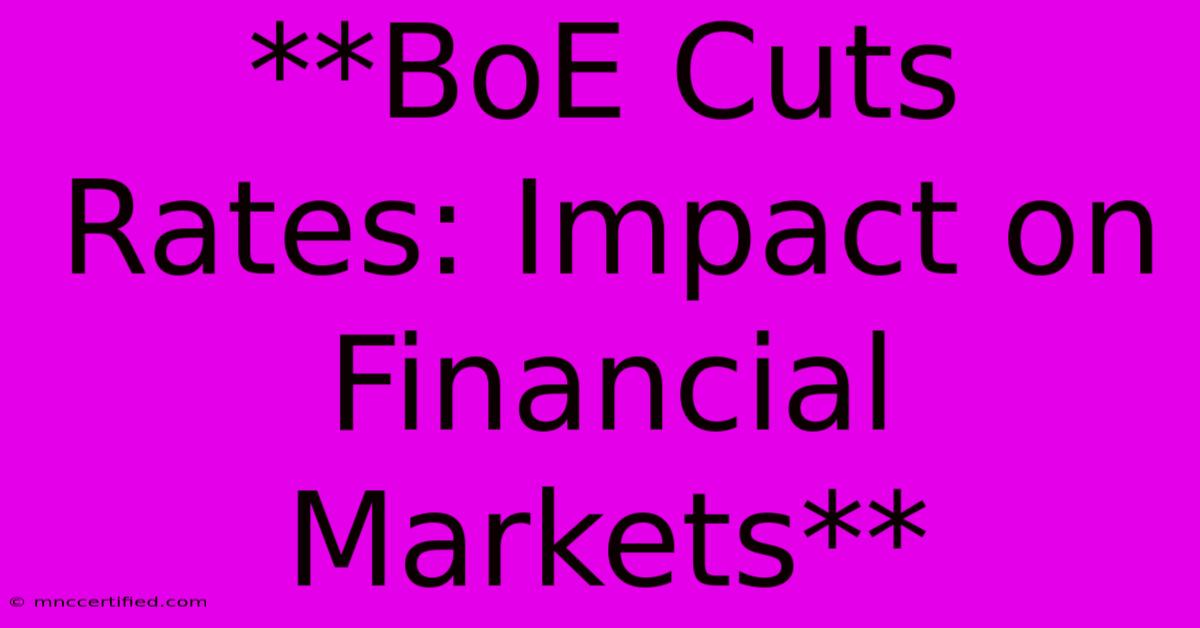**BoE Cuts Rates: Impact On Financial Markets**

Table of Contents
BoE Cuts Rates: Impact on Financial Markets
The Bank of England (BoE) recently announced a cut in interest rates, a move that sent ripples through the financial markets. This decision, driven by concerns about slowing economic growth and the potential for a recession, has sparked considerable discussion among investors and economists. This article will explore the potential impact of this rate cut on various aspects of the financial markets.
Understanding the Rate Cut
The BoE's decision to lower interest rates is intended to stimulate economic activity. By making it cheaper for businesses and individuals to borrow money, the central bank aims to encourage spending and investment, thereby boosting growth. However, the effectiveness of this strategy is often debated, particularly in the current economic climate.
Impact on Bond Markets
A rate cut typically leads to a decrease in bond yields. This is because investors are now seeking a lower return on their investments due to the reduced risk-free rate offered by the BoE. Lower bond yields mean that bond prices rise, making them more attractive to investors. This dynamic can have a significant impact on fixed-income portfolios.
Impact on Equity Markets
The impact of a rate cut on the equity market is more complex and often depends on various factors, including the state of the economy, investor sentiment, and corporate earnings. In the short term, a rate cut can boost stock prices as investors anticipate increased corporate profits due to lower borrowing costs. However, if the rate cut is not accompanied by other measures to stimulate economic growth, its positive effect on equities may be limited.
Impact on the Pound Sterling
The British pound is often affected by BoE rate decisions. A rate cut can lead to a weakening of the pound, as investors perceive the UK economy as less attractive compared to other countries with higher interest rates. A weaker pound can benefit exporters by making their goods more competitive in international markets, but it can also increase inflation.
Potential Risks
While a rate cut can offer short-term benefits, it also carries potential risks. One major concern is that it could fuel inflation, particularly if economic growth remains subdued and demand continues to outpace supply. Another risk is that it could encourage excessive borrowing, leading to a build-up of debt and ultimately exacerbating financial vulnerabilities.
Conclusion
The BoE's recent rate cut is a significant event that will have a ripple effect on the financial markets. While the potential benefits of a rate cut are clear, it's crucial to understand the associated risks and the complex interplay of factors that influence market behavior. As investors and economists closely monitor the unfolding economic landscape, the BoE's decision will undoubtedly continue to shape the trajectory of financial markets in the coming months.
Keywords: BoE, interest rates, rate cut, financial markets, bond markets, equity markets, pound sterling, inflation, borrowing, economic growth, recession, investor sentiment, corporate earnings.

Thank you for visiting our website wich cover about **BoE Cuts Rates: Impact On Financial Markets**. We hope the information provided has been useful to you. Feel free to contact us if you have any questions or need further assistance. See you next time and dont miss to bookmark.
Featured Posts
-
Guaranteed Issue Life Insurance Under 40
Nov 08, 2024
-
Man United Vs Paok Nov 7 Full Breakdown
Nov 08, 2024
-
Bo E Cuts Rates Impact On Financial Markets
Nov 08, 2024
-
Late Night Trump Victory Jimmy Kimmel Responds
Nov 08, 2024
-
M6 Crash Lorry Driver Killed Five Injured
Nov 08, 2024